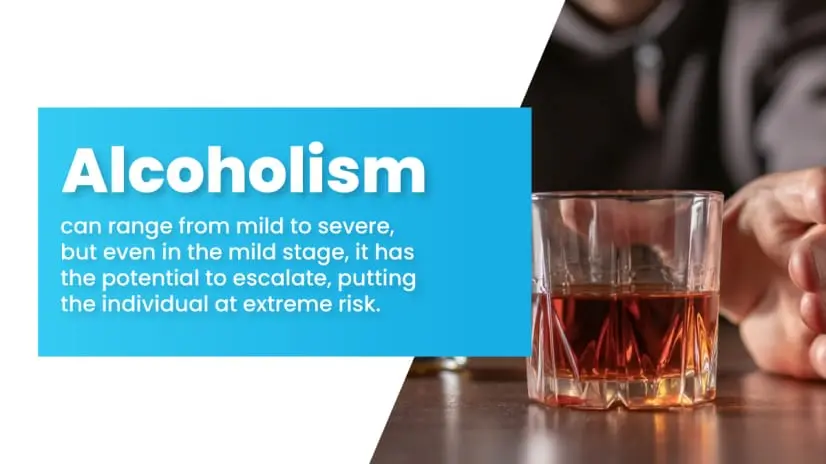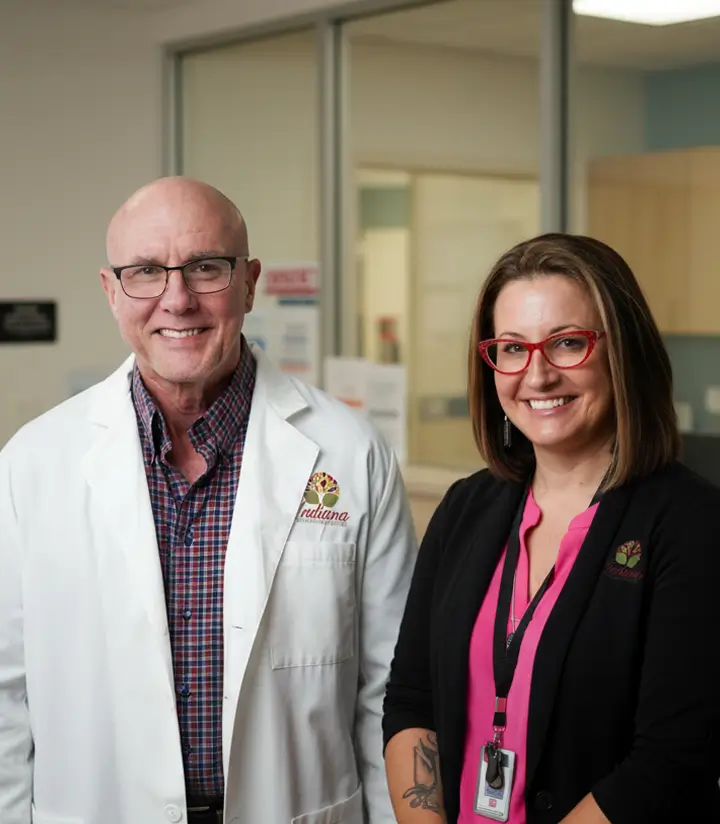
Am I An Alcoholic? The Warning Signs of Alcoholism
Clinically Reviewed by:
Individuals who struggle with alcoholism put their health and safety at risk due to their inability to control or quit drinking, even when drinking is causing personal, social, or financial problems. Keep reading to discover the warning signs of alcoholism and how to get treatment.

Key Takeaways
Alcohol use disorder (AUD), more commonly known as alcoholism, is a deadly, chronic disease. Here’s what you need to know to recognize alcoholism:
- Individuals struggling with alcoholism are unable to control the amount of alcohol they drink or are unable to stop drinking, no matter how much trouble it is causing them.
- Withdrawal symptoms cause people detoxing from alcohol to be at risk of seizures and death.
- Alcoholism can impact an individual’s health, relationships, finances, jobs, and daily responsibilities.
- Alcoholism can range from mild to severe, but even in the mild stage, it has the potential to escalate, putting the individual at extreme risk.
If you or a loved one are experiencing signs of alcoholism, reach out to Indiana Center for Recovery, an award-winning addiction treatment center.
Alcoholism Explained
Alcoholism impairs the ability to stop or control drinking despite personal or professional problems. As time passes, alcohol consumption progresses, causing damaging or fatal side effects. When attempting to stop cold turkey, people are at risk of withdrawal symptoms that can result in death. If you have a pattern of not being able to control the amount of alcohol, are unable to quit drinking, or have problems functioning in your daily life, you are likely struggling with alcoholism. If the problem is left untreated, it can escalate quickly, which is why getting immediate help is important.
Am I An Alcoholic? Self-Assessment Quiz
Answer the following yes or no questions truthfully:
- Have you ended up drinking more or longer than you originally planned to?
- Have you tried to cut down or stop drinking but couldn’t?
- Have you spent a lot of your time drinking or recovering from drinking?
- Have you felt a strong urge to drink?
- Has drinking, or being sick from drinking, interfered with your family life, job, school, or other responsibilities?
- Have you kept drinking even though it was causing trouble with your family or friends?
- Have you given up or reduced the activities you enjoyed just so you could drink?
- Has your drinking gotten you into dangerous situations?
- Has your drinking caused you health problems?
- Have you experienced withdrawal symptoms when the alcohol wears off?
- Have you noticed that you have built a tolerance to alcohol?
- Are you suffering from health complications due to drinking? Examples of these complications may affect your heart, liver, and brain functioning.
If you have answered yes to two or more of these questions, you may have alcohol use disorder. The more questions you identify with, the more serious the problem.
Alcohol Withdrawal Symptoms
Do you find yourself reaching for a drink in the morning to get rid of the shakes? If you answered yes, chances are that you are drinking to relieve or avoid withdrawal symptoms. This is a huge indicator of severe alcoholism. When you drink heavily and your body becomes dependent on alcohol consumption, you will experience withdrawal symptoms when there is no alcohol in the body.
Other frequent alcohol withdrawal symptoms include:
- Trembling or feeling jumpy
- Sweating
- Nausea and vomiting
- Insomnia
- Depression or fatigue
- Irritability and agitation
- Loss of appetite
- Headache
In severe cases, alcohol withdrawal symptoms can also include hallucinations, confusion, seizures, fever, and death. These are dangerous symptoms that should not go untreated. If you experience these symptoms, call for medical help, as this is a serious concern.
Alcoholism affects millions of individuals from all different social classes, races, and cultures. Help and support are always available for you or a loved one to get better.
When To Get Help
If you find yourself drinking too much alcohol, you are unable to control or quit drinking, or your drinking is causing problems, then you should consider getting medical help. Because withdrawal symptoms can be fatal, it is imperative to recognize the importance of medical supervision when detoxing.
Doctors will supervise and administer proper medication to keep you comfortable and safe until the alcohol is fully out of your system. Other resources for sober support and support groups include Alcoholics Anonymous and other 12-step programs. Here, you can find commonality and a solution in a community where people strive to help each other stay sober and find joy in living.
Frequently Asked Questions (FAQ)
What are some common initial warning signs of alcoholism?
Common initial warning signs of alcoholism often include increased tolerance to alcohol, frequent episodes of heavy drinking, and experiencing a strong urge and withdrawal symptoms when not drinking. Other signs include neglecting responsibilities because of drinking and continuing to drink despite problems with health, relationships, and finances.
Are there different stages of alcoholism showing different warning signs?
Yes, there are different stages of alcoholism, including early, middle, and late stages, with each stage showing different warning signs. In the early stage, the person may frequently drink alcohol, while the middle stage often involves the person hiding their drinking and becoming irritable. The late stage usually includes physical and mental health problems related to chronic alcohol abuse.
How do I differentiate between causal drinking and the early signs of alcoholism?
Causal drinking is characterized by moderate consumption in social settings, while early signs of alcoholism may include frequently drinking alone, needing alcohol to relax or feel better, having a strong urge to drink, and neglecting responsibilities due to alcohol use. Above all, when alcohol consumption begins to negatively affect a person’s day-to-day life and routines, it is normally a warning sign of alcoholism.
Treatment at Indiana Center for Recovery
Recognizing signs of alcoholism like increased tolerance, withdrawal symptoms, or difficulty cutting back? Indiana Center for Recovery offers professional help to break alcohol’s grip and build lasting recovery.
Our alcohol detox program provides 24/7 medical supervision to ensure a safe, comfortable withdrawal experience.
Following detox, our alcohol addiction treatment combines effective therapy with practical relapse prevention strategies. For those needing structured support, our residential alcohol rehab program creates a focused recovery environment away from triggers.
Get expert care at our alcohol rehab centers across Indiana. Call (844) 650-0064 today to discuss personalized treatment options for your situation.






 100% Confidential
100% Confidential
